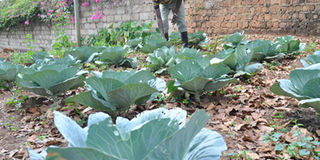Pay benefits to the poor, export labour

A farmer tends his garden of cabbages recently. Mr Otto says he would provide smallholder farming groups with modern farming equipment to increase production. PHOTO BY RACHEL MABALA
What you need to know:
Plans. Martin Otto, a graduate surveyor, is not pleased with policies of the current government on fighting unemployment, helping the poor, boosting agriculture and fighting corruption
Uganda is famously described as the Pearl of Africa. Unfortunately, approximately more than seven million of its inhabitants survive on less than a dollar a day.
For Uganda to move to a better state, priority has to be given to casting out self-doubt and nurture hope for a bright future with an economic system based on self-sustaining economic growth. To fill the minds of Ugandans with images of a 21st Century country flowing with wealth, emphasis must be put on promoting entrepreneurship, innovation, education and self-sufficiency.
Planning board
In John F Kennedy’s words: ‘Effort and courage are not enough without purpose and direction’. In my first 100 days as the president of Uganda, I would form a planning board to develop a five-year blueprint for allocating capital and attracting foreign capital. The first days of my presidency would, therefore, be dedicated to planning reforms with a clear budget detailing how the resources for a massive transformation would be generated and distributed.
fight corruption
The next step would be to reduce corruption in order for the plan to be implemented effectively and the resources optimised. Corruption will be curbed by creating transparency and openness in government spending; subsidies, tax exemptions, public procurement of goods and services, soft credits and extra budgetary funds under the control of politicians.
Government spending will be monitored by a legal framework for transparent management of public resources to ensure that they are used in the public interest. The red tape involved in opening up new businesses, registering properties, acquisition of certificates and licences, which usually breed corruption, would be minimised through smart technology. The internet would be deployed to minimise direct contact between government officials and citizens which opens way for illicit transactions.
INFORMATION TECHNOLOGY
For example, online platforms would be used to facilitate tax collection, public procurement and minimise red tape. All government institutions would be restructured to implement a performance-based organisation structure that operates in a business-like manner. Government employee contracts would be evaluated every three years to ensure that only competent servants continue serving the nation.
INDUSTRIALISATION
The national economy would be industrialised with manufacturing at its heart; steel, coal, petrochemical and machine building industries will be set up alongside light industries such as textile and needlework. These industries would provide more employment to the huge number of unemployed citizens.
Government would also be able to export industrial materials to generate capital. The market for industrial materials, especially construction material is readily available, for example, in South Sudan.
EMPLOYMENT PLAN
Vocational training would be provided to those unable to join secondary schools, which will produce a more highly skilled work force.
Jobs would also be guaranteed by coordinating with local communities and nonprofit organisations to provide jobs. The workforce would be protected from exploitation by a minimum wage bill that would be implemented.
Alternatively, the available experienced Ugandan professionals would be exported abroad to countries where their services are needed. The government would generate capital through taxing the money that the foreign-based expatriates would send back home and in the long run, gain from their diverse experience. To improve the standards of rural schools, a computer per classroom project would be introduced in UPE schools.
Introduction of computer education at primary level would be aimed at skilling the population to cope with technological advancement that would promote the much needed development. A community movement would be initiated to improve living standards; individuals would receive free cement and those that show promise would be provided more cement and steel bars for building decent low cost housing designed by the government.
SALARY FOR THE POOR
Poor families would be paid monthly benefits from government as a cushion against day-to-day expenses and offer people chance to accumulate some capital for business. Every Ugandan would be provided with a modestly stocked savings account at birth, which could be drawn upon for paying for education or any other future expenses for the child. A shared resource scheme would be introduced to smallholder farming groups at the village level.
Agriculture
The smallholder farming groups would be provided with shared modern farming equipment such as tractors to help with cultivation and other materials to construct storage facilities to store produce at a community level before marketing. This would reduce post-harvest losses that are experienced at farm level.
With access to the shared modern farming equipment and storage facility for produce that an individual would otherwise not afford, agricultural produce would have an added value. In addition, a new education programme with a goal of quality of life and economic improvement targeting particularly smallholder farmers would be provided to the groups. The education will cover handling modern farming equipment, farming techniques, marketing and solving social problems. Lastly, every household will be encouraged to adopt family planning methods.




